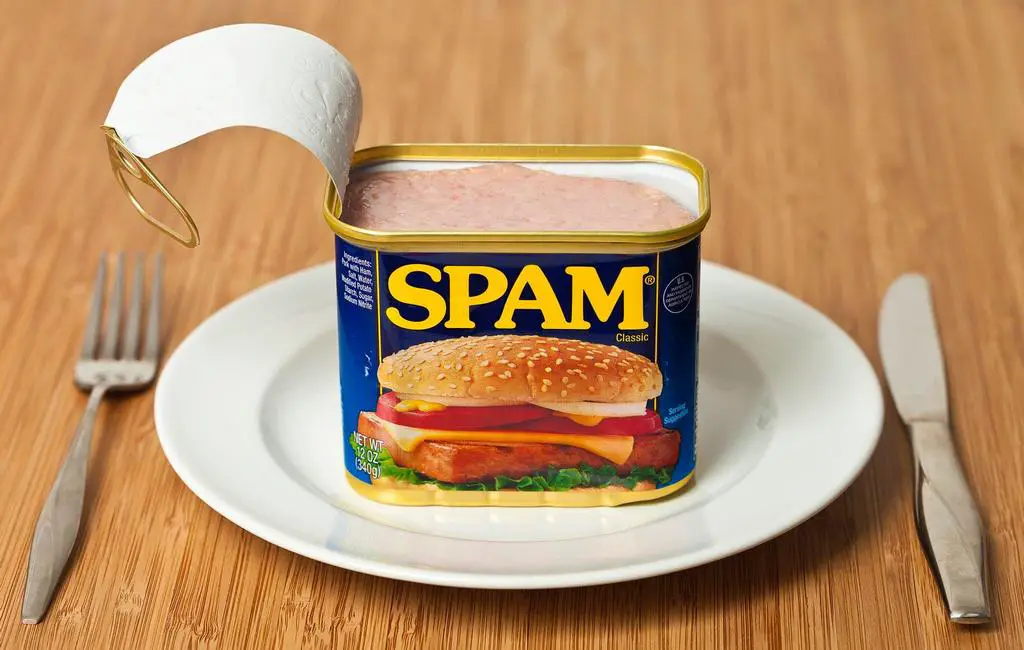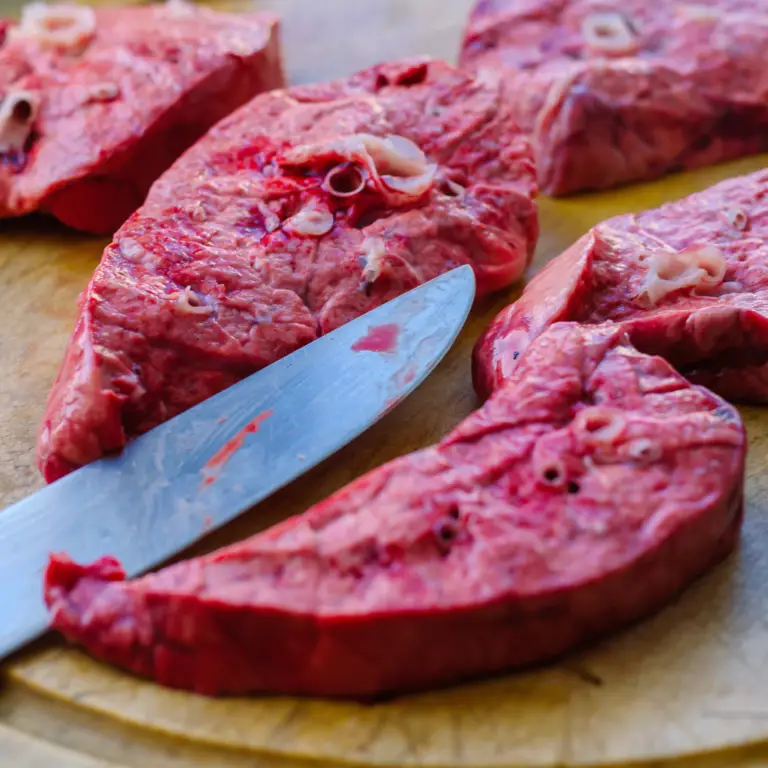Can You Eat Spam or Processed Meats on Carnivore Diet?

In a world where dietary trends are as fickle as fashion, the Carnivore Diet has emerged as a formidable contender in the realm of health and nutrition. This meat-centric regimen, often celebrated for its primal simplicity, invites us to channel our inner caveman or cavewoman.
But as we embark on this carnivorous journey, there’s a pressing question that demands our attention: Can you eat processed meats, such as Spam, while still adhering to the Carnivore Diet’s strict principles?
Yes, you can eat Spam or processed meats on a carnivore diet, but it’s not recommended. Processed meats, sauces, alcohol, nuts, seeds, rice, pasta, and lean cuts of meat are not recommended due to their high carbohydrate or additive content.
As we navigate this culinary crossroads, we’ll delve into the heart of the Carnivore Diet, dissecting its rules and uncovering its core tenets. We’ll explore the significance of embracing whole foods, the potential pitfalls of processed meats, and whether that beloved can of Spam can find a place on our Carnivore plates.
Join us on this culinary journey as we explore the delicate balance between carnivorous cravings and dietary devotion if you are a meat lover wondering what will become of your processed favorites.
What is the Carnivore Diet?

The Carnivore Diet has gained significant attention in recent years for its all-meat, no-plant approach to eating. Advocates of this controversial diet claim a range of benefits, from improved energy levels and mental clarity to weight loss and reduced inflammation.
This carnivorous lifestyle essentially involves consuming only animal products such as meat, fish, eggs, and dairy while eliminating all forms of plant-based foods, including fruits, vegetables, grains, and legumes.
While some argue that the Carnivore Diet goes against conventional nutritional wisdom and may lack essential nutrients found in plant-based foods like vitamins, minerals, fiber, and antioxidants, others praise it for effectively addressing health issues like autoimmune diseases and digestive problems.
However, one question frequently arises among those considering this dietary pattern – can processed meats be included? While many adhere to a strict interpretation of the Carnivore Diet by solely consuming unprocessed meats like steak or ground beef, others opt for processed meats like bacon or sausages with added spices or preservatives.
Read: Beef Version of Spam: Exploring the World of Canned Meats
Can You Eat Spam on the Carnivore Diet?
Yes, you can include spam or other processed meats in your carnivorous diet. While spam may technically fall into the category of meat, its high sodium content and inclusion of preservatives raise concerns for some adherents of the diet.
Spam, a popular canned meat product, is made from pork shoulder and ham. However, it also contains ingredients like salt, sugar, potato starch, and sodium nitrite—all additives that don’t align with the strict principles of the Carnivore Diet.
Furthermore, many processed meats, like spam, have been linked to various health issues, such as an increased risk of cancer and heart disease. Hence, those following a Carnivore Diet aiming to optimize their health might want to steer clear of spam altogether.
Instead of relying on processed meats like spam for their carnivorous needs on this diet plan, individuals can focus on consuming fresh, unprocessed cuts of meat such as beef steaks or roasts from pasture-raised animals. This way, they can ensure they’re truly embracing an animal-based way of eating while minimizing the potential health risks associated with processed foods.
So while tempting for its convenience and nostalgia factor for some people who grew up enjoying it in dishes like fried rice or sandwiches – if you’re committed to following a strict Carnivore Diet for optimal wellness reasons – giving up spam might be necessary to fully adhere to the healthy diet rules.
See also: Is Luncheon Meat And Spam The Same?
Processed Meats on the Carnivore Menu
Processed meats, like Spam, are a point of contention within the carnivore community. These foods undergo various preservation methods, such as salting, curing, or canning, which might involve additives or preservatives. Spam, for instance, is a canned processed meat product made from pork, salt, water, and sodium nitrite for preservation.
The carnivore diet typically advocates for whole, unprocessed foods. However, the definition of “processed” can vary. Some carnivore practitioners choose to include processed meats in their diet, while others avoid them due to the presence of additives and the potential for negative health effects.
Pros and Cons of Including Spam into Carnivore Diets
Pros
- Convenience: Spam is a long-lasting, shelf-stable meat product, making it a convenient option for carnivores on the go.
- Variety: Including processed meats can add variety to the carnivore diet, preventing monotony and boredom.
- Amino Acids: Processed meats can still provide essential amino acids and nutrients found in fresh meat.
Cons
- Additives: Processed meats like Spam often contain additives, such as sodium nitrite, which some people prefer to avoid due to potential health concerns.
- Quality: The quality of processed meats may vary, and sourcing high-quality, additive-free options can be a challenge.
- Inflammatory Response: Some individuals on the carnivore diet report an increase in inflammation when consuming processed meats.
Making an Informed Choice
The decision to include Spam or other processed meats in a carnivore diet depends on personal preferences, health goals, and individual reactions. If you’re considering it, here are some steps to help you make an informed choice:
1. Read Labels Carefully
When selecting processed meats, read the labels on Spam to identify additives and preservatives. Opt for options with the fewest additives or seek out brands that offer additive-free products.
2. Monitor Your Body’s Response
Every individual reacts differently to foods. If you choose to incorporate Spam, pay close attention to your body’s response. If you notice any adverse effects, reconsider your choice.
3. Seek Quality Sources
If you decide to include processed meats in your carnivore diet, look for reputable brands and sources that prioritize quality and minimal processing.
4. Consult a Nutritionist or Dietitian
For personalized advice, consider consulting a nutritionist or dietitian who specializes in the carnivore diet. They can provide tailored guidance based on your unique dietary needs and goals.
A Sample Menu with Spam
For those curious about incorporating Spam into their carnivore diet, here’s a sample meal plan:
| Meal | Description |
| Breakfast | Scrambled eggs with Spam slices |
| Lunch | Spam and cheese elote roll-ups |
| Dinner | Grilled Spam with a side of scrapple or bacon |
| Snack | Spam jerky or Spam chips |
What Are the Alternatives to Processed Meats on the Carnivore Diet?
On the Carnivore Diet, your palate can still revel in a variety of delectable options that steer clear of processed meats. Picture a table adorned with a succulent array of fresh, unprocessed meats: beef, lamb, poultry, and fish. These pristine choices serve as the diet’s backbone, offering rich protein sources without the additives or preservatives that processed meats often hide.
Dive deeper into the carnivore’s treasure trove, and you’ll find eggs, a versatile source of nourishment that can be enjoyed in various preparations. Organ meats, too, take center stage, delivering essential nutrients like iron, zinc, and vitamin B12. And let’s not forget the comfort of bone broth, a steaming elixir brimming with collagen and essential amino acids.
This wholesome assortment not only adheres to the Carnivore Diet but also tantalizes the taste buds, making your culinary journey a delectable one.
In summary, when you’re exploring the world of the Carnivore Diet, you’re not limited to just processed meats. Instead, you have a smorgasbord of fresh, unprocessed options at your disposal, ensuring that your diet is both satisfying and in harmony with the diet’s principles. Check out the table below for a quick reference to these alternatives:
| Carnivore Diet Alternatives to Processed Meats |
| 1. Fresh Meats: Beef, Lamb, Poultry, Fish |
| 2. Eggs |
| 3. Organ Meats |
| 4. Bone Broth |
Conclusion
The carnivore diet is a unique dietary approach that emphasizes animal-based foods while excluding plant-based products. While processed meats like Spam are not the primary focus of this diet, some individuals choose to include them for convenience, variety, and taste.
However, it’s crucial to be aware of the potential drawbacks associated with additives and individual reactions.
Ultimately, whether you should eat Spam or processed meats on a carnivore diet depends on your goals and personal preferences. By making informed choices, monitoring your body’s response, and seeking quality sources, you can navigate the carnivore diet while occasionally indulging in processed meats like Spam, all while enjoying the potential benefits of this dietary approach.
FAQs on Processed Meats on a Carnivore Diet
Is Spam considered a processed meat?
Yes, Spam is considered a processed meat, typically made from pork shoulder and ham. It undergoes a process of blending, cooking, and canning, which categorizes it as a processed product.
Can processed meats be harmful to health on the Carnivore Diet?
Consuming processed meats excessively on the Carnivore Diet might increase the risk of certain health issues, including heart disease and certain cancers. Moderation and selecting high-quality processed meats can help mitigate these risks.
How does the body process processed meats on a strict Carnivore Diet?
On a strict Carnivore Diet, the body digests processed meats similarly to other meats. The digestive system breaks down proteins and fats for energy, with nutrients being absorbed into the body for various physiological functions.
Are there any health benefits to including processed meats in the Carnivore Diet?
While processed meats might offer convenience, they generally lack the same level of nutritional benefits as fresh, unprocessed meats. Limited consumption of high-quality processed meats can still provide a source of protein and certain nutrients.
Can the Carnivore Diet lead to deficiencies in essential nutrients?
Yes, the Carnivore Diet might lead to deficiencies in certain nutrients such as fiber, vitamins C and E, and phytonutrients. It’s crucial to incorporate a diverse range of animal products and consider supplementation to address potential deficiencies.
What is the role of fiber in a Carnivore Diet, and how can one compensate for its absence?
Fiber is typically absent in a Carnivore Diet, which may impact digestive health. To compensate, individuals can focus on consuming organ meats and consider incorporating supplements like psyllium husk or other fiber alternatives under the guidance of a healthcare provider.






